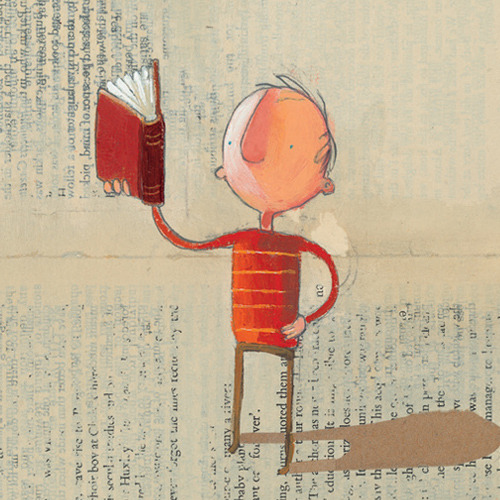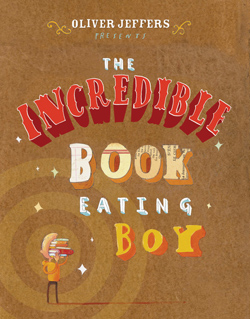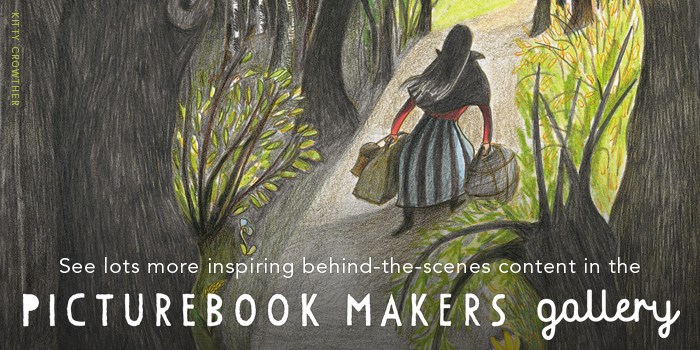< Back to posts
Oliver Jeffers
United Kingdom

Oliver Jeffers is an artist and illustrator who is widely known for his picturebooks for children. He debuted with ‘How to Catch a Star’ in 2004 to critical acclaim. This was followed by ‘Lost and Found’, which won the Nestlé Smarties Book Prize Gold Medal, the Blue Peter Book Award and was shortlisted for the Kate Greenaway Medal.
In this post, Oliver shares some illustrations from his award-winning picturebook, ‘The Incredible Book Eating Boy’. He also talks about his career as an artist and picturebook maker, and how his books and fine art are more closely linked than people often think.

Oliver: I am a storyteller at heart.
Though making picture books wasn't the first form my storytelling took.
I am also an artist, and embarked on a career as a painter almost twenty years ago.
My early paintings were made as a form of storytelling. Many of my first canvases depicted moments that suggested a larger narrative that bled off the edges. Perhaps you're viewing the middle of a story, or perhaps the canvas is pure momentum and the story is just about to begin. Sometimes what's shown is the aftermath of events left undocumented.
Either way, it was all narrative.
They were all stories that occasionally used words as a way to either compliment or contrast what you were seeing. I had fun with that.
That was the way I told stories until I discovered picture books.
In picture books I found the true playground where words and images interacted with one another. It began when I was sketching for a body of work where someone is capable of physically catching something as intangible as a star. My singular sketches morphed into the beginning, middle and end of a story. Without much choice, I was left with a picture book.
That was that.
Many people believed that my career forked in two at that point: making picture books and making art. My picture books are clearly about telling stories and my art work is clearly about asking questions. But that isn't entirely true – it didn't fork.
Yes, my picture books are about storytelling at its most core level. I grew up surrounded by storytellers and learned, at an early age, there's an art to the act. My books do not set out to impart wisdom or teach thinly-veiled morals. Rather, they are made to entertain, perhaps instil in others the sense of wonder and curiosity I'm fortunate enough to remember as a child.
And, yes, my art is about question asking. When picture books quenched my thirst to explore the play of word and image, the words fell away from my paintings. The words were replaced with numbers: first as a graphic device, then, not wanting to do so arbitrarily, I began to explore mathematics and how our world works. I fell into a fascinating conversation with my now wife about our different university experiences. I studied art, where as long as you have enough guff to back up what you make, you can pretty much get away with anything. She studied engineering where there's a very clear right or a wrong answer with legitimate consequences. I became transfixed with this apparent paradox in how we understand our world. Here were two completely different, but entirely valid ways in which we could view things: artistically and logically. It is to that end I've been making art ever since.
Now, nowhere is it clearer that the perceived split between my books and my art is not so, than with my third title, ‘The Incredible Book Eating Boy’.
As I mentioned earlier, I'm a storyteller at heart. As most writers and storytellers will admit, every so often we are lucky enough to find the nugget of a story that, once uncovered, tells itself. ‘The Incredible Book Eating Boy’ was exactly that type of story. This book came about because of three things.
The first is a random drawing I made while waiting on a delayed flight. It depicted someone throwing a book up through the air and into his mouth.
Secondly, I had been collecting a lot of old and discarded library books. I was using the covers for an art project called ‘BOOK’, whereby I sent a sketchbook around the world between myself and three other artists, in a call and response manner. Despite not needing the interiors of these books, I couldn't quite bring myself to throw them away. So they sat in a pile beside my desk while I was trying to visualise this idea of making a book about books. The inspiration to draw on the pages of old books was one that occurred to me while staring at that pile.
Thirdly, I'd been making paintings about mathematics. When I initially started a series to explore the potential of simultaneously viewing the world both logically and emotionally, I began by placing mathematical equations atop classical style still life paintings. Through the first of these paintings (‘Understanding Everything’, a glass of orange with the equation for the refraction of light on top), I met a Doctor of Quantum Physics at Queens University in Belfast, who introduced me to the search within his field for the unifying Theory of Everything.
We decided to work on a project together, called ‘Additional Information’, where we paired equations with figurative paintings.
It was during that project that the final piece of the puzzle for my story fell into place.
It occurred to me that the byproduct of this ridiculous and graphic act of gobbling books must be that the information got digested by the brain. At this point, the story unrolled like a red carpet. It's no coincidence at all that both projects were about the quest for ultimate intelligence.
Illustrations and paintings © Oliver Jeffers.
The Incredible Book Eating Boy
Oliver Jeffers
HarperCollins, United Kingdom, 2009
Henry loves books... but not like you and I. He loves to EAT books! This exciting story follows the trials and tribulations of a boy with a voracious appetite for books.
‘Mouth-wateringly irresistible.’ —The Guardian
‘This is a book that children will devour.’ —The Observer
‘A beautifully produced edition that really is good enough to eat.’ —The Bookseller
- English: HarperCollins (UK) — Philomel (USA)
- French: Kaleidoscope
- Italian: Zoolibri
- German: Oetinger
- Portuguese: Orfeu Negro
- Portuguese (Brazil): Moderna
- Spanish: Fondo de Cultura Económica
- Catalan: Anadana
- Galician: Patasdepeixe
- Chinese (Simplified): Jieli Publishing House
- Korean: Gimmyoung
- Thai: Nanmee Books
- Hebrew: Keter
- Farsi: Kanoon
- Romanian: Vallent















